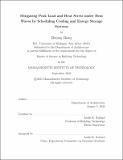| dc.contributor.advisor | Norford, Leslie K. | |
| dc.contributor.author | Zhang, Zhujing | |
| dc.date.accessioned | 2023-01-19T18:49:03Z | |
| dc.date.available | 2023-01-19T18:49:03Z | |
| dc.date.issued | 2022-09 | |
| dc.date.submitted | 2022-09-26T09:29:02.170Z | |
| dc.identifier.uri | https://hdl.handle.net/1721.1/147376 | |
| dc.description.abstract | As the climate changes, heat waves are becoming more frequent and severe. Exposure to heat waves could lead to heat stress. Heat waves intensify cooling demand and reduce air conditioner efficiencies. It causes peaks in electricity demand that pose operational challenges to the power grid. This thesis provides simulation-based methods to mitigate peak load and heat stress under heat waves by adjusting the schedules of the cooling and energy storage systems in buildings. This thesis demonstrates three scheduling methods: (1) cooling system scheduling, (2) energy storage system scheduling, and (3) combined cooling and energy storage system scheduling. The cooling system scheduling methods involve (1) generating baseline and training data with EnergyPlus (𝐸𝑃) simulations, (2) fitting surrogate models that relate cooling system adjustments to the perturbations in purchased power and Standard Effective Temperature (𝑆𝐸𝑇* , a comprehensive measure of thermal comfort, which is found to be a useful measurement of heat stress), and (3) embedding the 𝐸𝑃 data and trained models in an optimizer to schedule cooling system adjustments. The methods provide closely predicted optimized solutions with less computation cost than solving the problem by brute-force 𝐸𝑃 simulations. The energy storage system scheduling method relocates the power discharging from the energy storage system based on 𝐸𝑃 simulated baseline grid purchased power and its average value. The scheduling of the cooling and energy storage systems combines the two methods above. Case studies of these methods on a single building and a six-building neighborhood in the climate of Miami and Kuwait are offered. In these case studies, the methods reduce peak load significantly while maintaining 𝑆𝐸𝑇* within comfortable ranges. Among the three methods, the combined scheduling of cooling and energy storage systems is able to reduce peak power the most. | |
| dc.publisher | Massachusetts Institute of Technology | |
| dc.rights | In Copyright - Educational Use Permitted | |
| dc.rights | Copyright MIT | |
| dc.rights.uri | http://rightsstatements.org/page/InC-EDU/1.0/ | |
| dc.title | Mitigating Peak Load and Heat Stress under Heat Waves by Scheduling Cooling and Energy Storage Systems | |
| dc.type | Thesis | |
| dc.description.degree | S.M. | |
| dc.contributor.department | Massachusetts Institute of Technology. Department of Architecture | |
| mit.thesis.degree | Master | |
| thesis.degree.name | Master of Science in Building Technology | |
